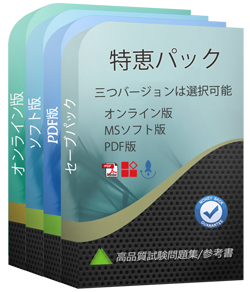割引はありますか?
我々社は顧客にいくつかの割引を提供します。 特恵には制限はありません。 弊社のサイトで定期的にチェックしてクーポンを入手することができます。
返金するポリシーはありますか? 失敗した場合、どうすれば返金できますか?
はい。弊社はあなたが我々の練習問題を使用して試験に合格しないと全額返金を保証します。返金プロセスは非常に簡単です:購入日から60日以内に不合格成績書を弊社に送っていいです。弊社は成績書を確認した後で、返金を行います。お金は7日以内に支払い口座に戻ります。
あなたのテストエンジンはどのように実行しますか?
あなたのPCにダウンロードしてインストールすると、DSCI DCPLAテスト問題を練習し、'練習試験'と '仮想試験'2つの異なるオプションを使用してあなたの質問と回答を確認することができます。
仮想試験 - 時間制限付きに試験問題で自分自身をテストします。
練習試験 - 試験問題を1つ1つレビューし、正解をビューします。
Tech4Examはどんな試験参考書を提供していますか?
テストエンジン:DCPLA試験試験エンジンは、あなた自身のデバイスにダウンロードして運行できます。インタラクティブでシミュレートされた環境でテストを行います。
PDF(テストエンジンのコピー):内容はテストエンジンと同じで、印刷をサポートしています。
更新されたDCPLA試験参考書を得ることができ、取得方法?
はい、購入後に1年間の無料アップデートを享受できます。更新があれば、私たちのシステムは更新されたDCPLA試験参考書をあなたのメールボックスに自動的に送ります。
購入後、どれくらいDCPLA試験参考書を入手できますか?
あなたは5-10分以内にDSCI DCPLA試験参考書を付くメールを受信します。そして即時ダウンロードして勉強します。購入後にDCPLA試験参考書を入手しないなら、すぐにメールでお問い合わせください。
DCPLAテストエンジンはどのシステムに適用しますか?
オンラインテストエンジンは、WEBブラウザをベースとしたソフトウェアなので、Windows / Mac / Android / iOSなどをサポートできます。どんな電設備でも使用でき、自己ペースで練習できます。オンラインテストエンジンはオフラインの練習をサポートしていますが、前提条件は初めてインターネットで実行することです。
ソフトテストエンジンは、Java環境で運行するWindowsシステムに適用して、複数のコンピュータにインストールすることができます。
PDF版は、Adobe ReaderやFoxit Reader、Google Docsなどの読書ツールに読むことができます。
あなたはDCPLA試験参考書の更新をどのぐらいでリリースしていますか?
すべての試験参考書は常に更新されますが、固定日付には更新されません。弊社の専門チームは、試験のアップデートに十分の注意を払い、彼らは常にそれに応じてDCPLA試験内容をアップグレードします。
DSCI Certified Privacy Lead Assessor DCPLA certification 認定 DCPLA 試験問題:
1. 'Map the legal and compliance requirements to each data element that an organization is dealing with in all of its business processes, enterprise and operational functions, and client relationships.' This an imperative of which DPF practice area?
A) Privacy Policy and Processes (PPP)
B) Regulatory Compliance Intelligence (RCI)
C) Visibility over Personal Information (VPI)
D) Privacy Organization and Relationship (POR)
2. With respect to privacy implementation, organizations should strive for which of the following:
A) Demonstrable accountability
B) Checklist based exercise
C) Meaningful compliance
D) None of the above
3. FILL BLANK
RCI and PCM
In April 2011, the rules were issued under Section 43A of the IT Act by the Government of India and the
'body corporates' were required to comply with these rules. The Corporate legal team tried to understand and interpret the rules but struggled to understand its applicability esp. to client relationships and business functions. So, the company hired an IT Act legal expert to advise them on the Section 43A rules.
To start with, the company identified the PI dealt with by business functions as part of the earlier visibility exercise, but it wanted to reassure itself. Therefore, a specific exercise was conducted to revisit 'sensitive personal information' dealt by business functions. It was realized that the company collects lot of SPI of its employees and therefore 'reasonable security practices' need to be adhered to by the functions that deal with SPI. It was also ascertained that many of this SPI is being dealt by third parties, some of which are also located outside India. To meet the requirements of the rules, the company reviewed all the contracts and inserted a clause - 'the service provider shall implement reasonable security practices and procedures as per the IT (Amendment) Act, 2008'. Some of the large service providers were ISO 27001 certified and they claimed that they fulfill the requirements of 'reasonable security practices'. However, some SME service providers did not understand what would 'reasonable security practices' imply and requested the company to clarify, which referred them to Rule 8 of the Section 43A. Some small scale service providers expressed their unwillingness to get ISO certified, given the costs involved.
(Note: Candidates are requested to make and state assumptions wherever appropriate to reach a definitive conclusion) Introduction and Background XYZ is a major India based IT and Business Process Management (BPM) service provider listed at BSE and NSE. It has more than 1.5 lakh employees operating in 100 offices across 30 countries. It serves more than
500 clients across industry verticals - BFSI, Retail, Government, Healthcare, Telecom among others in Americas, Europe, Asia-Pacific, Middle East and Africa. The company provides IT services including application development and maintenance, IT Infrastructure management, consulting, among others. It also offers IT products mainly for its BFSI customers.
The company is witnessing phenomenal growth in the BPM services over last few years including FinanceandAccounting including credit card processing, Payroll processing, Customer support, Legal Process Outsourcing, among others and has rolled out platform based services. Most of the company's revenue comes from the US from the BFSI sector. In order to diversify its portfolio, the company is looking to expand its operations in Europe. India, too has attracted company's attention given the phenomenal increase in domestic IT spend esp. by the government through various large scale IT projects. The company is also very aggressive in the cloud and mobility space, with a strong focus on delivery of cloud services. When it comes to expanding operations in Europe, company is facing difficulties in realizing the full potential of the market because of privacy related concerns of the clients arising from the stringent regulatory requirements based on EU General Data Protection Regulation (EU GDPR).
To get better access to this market, the company decided to invest in privacy, so that it is able to provide increased assurance to potential clients in the EU and this will also benefit its US operations because privacy concerns are also on rise in the US. It will also help company leverage outsourcing opportunities in the Healthcare sector in the US which would involve protection of sensitive medical records of the US citizens.
The company believes that privacy will also be a key differentiator in the cloud business going forward. In short, privacy was taken up as a strategic initiative in the company in early 2011.
Since XYZ had an internal consulting arm, it assigned the responsibility of designing and implementing an enterprise wide privacy program to the consulting arm. The consulting arm had very good expertise in information security consulting but had limited expertise in the privacy domain. The project was to be driven by CIO's office, in close consultation with the Corporate Information Security and Legal functions.
Did the company take sufficient steps to protect SPI dealt by its service providers and ensure that it complies with the regulatory requirements? Was referring to 'reasonable security practices' sufficient in the contracts or the company should have also considered some other measures for privacy protection as well? (250 to 500 words)
4. Categorise the following statement:
"In case of eventualities or incidents, the organization struggles to locate source, evaluate reasons and fix the accountability."
A) Enforcement
B) Demonstration
C) Capability
D) Visibility
5. Certification once granted, will be valid for period of _______ years subject to surveillance assessments.
A) 5
B) 1
C) 4
D) 3
質問と回答:
| 質問 # 1 正解: B | 質問 # 2 正解: A | 質問 # 3 正解: メンバーにのみ表示されます | 質問 # 4 正解: D | 質問 # 5 正解: D |


 弊社は製品に自信を持っており、面倒な製品を提供していません。
弊社は製品に自信を持っており、面倒な製品を提供していません。



 -Ichiki
-Ichiki

